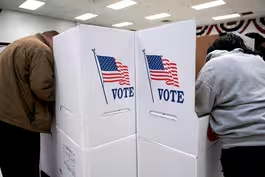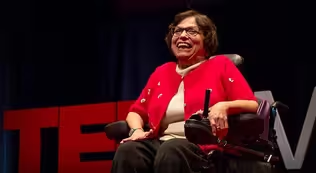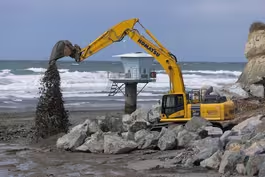
CDC director on how the agency's addressing COVID shortfalls
Clip: 3/6/2023 | 7m 46sVideo has Closed Captions
CDC Director Dr. Rochelle Walensky discusses how the agency is addressing COVID shortfalls
Three years ago this month the U.S. began shutting down due to the explosive spread of COVID. But as the country enters its fourth year with the virus, many people believe the pandemic is over. This as the CDC reports nearly 2,300 deaths tied to COVID in the last week and an average of more than 3,000 people hospitalized each day. CDC Director Dr. Rochelle Walensky joins Geoff Bennett to discuss.
Problems playing video? | Closed Captioning Feedback
Problems playing video? | Closed Captioning Feedback
Major corporate funding for the PBS News Hour is provided by BDO, BNSF, Consumer Cellular, American Cruise Lines, and Raymond James. Funding for the PBS NewsHour Weekend is provided by...

CDC director on how the agency's addressing COVID shortfalls
Clip: 3/6/2023 | 7m 46sVideo has Closed Captions
Three years ago this month the U.S. began shutting down due to the explosive spread of COVID. But as the country enters its fourth year with the virus, many people believe the pandemic is over. This as the CDC reports nearly 2,300 deaths tied to COVID in the last week and an average of more than 3,000 people hospitalized each day. CDC Director Dr. Rochelle Walensky joins Geoff Bennett to discuss.
Problems playing video? | Closed Captioning Feedback
How to Watch PBS News Hour
PBS News Hour is available to stream on pbs.org and the free PBS App, available on iPhone, Apple TV, Android TV, Android smartphones, Amazon Fire TV, Amazon Fire Tablet, Roku, Samsung Smart TV, and Vizio.
Providing Support for PBS.org
Learn Moreabout PBS online sponsorshipGEOFF BENNETT: It was three years ago this month when the U.S. began shutting down due to the explosive spread of COVID-19.
The country is now into its fourth year with the virus, and it's fair to say that, to many people, the pandemic is over.
But COVID isn't done with us.
The CDC reports there were nearly 2,300 deaths tied to COVID over the last week, and more than 3,000 people hospitalized each day with it on average.
Throughout the pandemic, the Centers for Disease Control and Prevention has been criticized for its response, and the agency is now undergoing a major reorganization after an internal review identified shortcomings.
We're joined now by CDC Director Dr. Rochelle Walensky.
Welcome back to the "NewsHour."
DR. ROCHELLE WALENSKY, CDC Director: Thanks so much for having me, Geoff.
GEOFF BENNETT: And you have said that the CDC failed to respond quickly enough to the pandemic and that the agency was responsible for some pretty dramatic public mistakes, from testing, to data sharing, to communication.
What are you doing now to address it?
DR. ROCHELLE WALENSKY: You know, I feel like our responsibility now is to be the public health agency of the future and to be sure that we are prepared for every next public health urgency and emergency that we face.
We have done a huge amount of work within the agency.
You mentioned reorganization, but much more work than that, including increasing the rapidity at which we get science out, how that science gets out, how we communicate it, and how quickly we are able to communicate it, and then really being a response-based agency, where we have always been known as an academic, science-based agency, but we also need to be a response-based agency where we're ready to respond.
So much of the work that we're doing within the agency is critically important.
But we also really need help from Congress to be all that we can be in public health.
GEOFF BENNETT: A question about the CDC being a response-based agency.
We talked with a number of public health experts in advance of speaking with you, and nearly all of them pointed to what they saw as the biggest challenge, perhaps the toughest challenge, which is changing the culture at the CDC, that, as you mentioned, the CDC is an academic institution with, but that it has to be a nimble, action-focused public health agency.
How are you going to accomplish that?
Because a reorganization, in and of itself, may not be enough.
DR. ROCHELLE WALENSKY: And, in fact, you're - - I have said exactly that to the agency, that the reorganization was necessary, but not sufficient, for the work that we need to do.
We have been known as an exceptional science-based agency, and we need to be a response-based agency.
We have a responsibility such that, when there is a public health urgency and emergency, that we have a public health work force within CDC and truly around the country that is responder-driven and responder-based.
We're doing a lot of training within the agency.
We're doing -- we have -- in part of our reorganization, we have escalated the readiness and response-based office directly into the immediate office of the director.
And there's a real motivation within the agency to -- toward that change.
That said, we're doing all of these efforts within the agency, but this is, again, another one of those areas where it would be super helpful to have congressional support.
We don't enjoy many of the authorities that response-based agencies like FEMA do enjoy, for example, overtime pay or danger pay or direct hiring authorities.
Those are some of the authorities, from a human resource perspective, that would be incredibly helpful for us to be the full response-based agency that we need to be.
GEOFF BENNETT: What about data sharing?
Does the CDC have the authority it needs to compel states to share data?
And I ask the question because the U.S. was relying on data from Israel to make recommendations for booster shots for Americans.
And that raised a lot of questions and concerns.
And there has been this criticism that the CDC hasn't shared information as quickly as it needs to.
DR. ROCHELLE WALENSKY: Yes, I'm really glad you asked that question.
So we do need to share our data faster when we get it.
And we have been actively doing that.
And I think you can see some of the responses from our mpox response about how we were getting our data out faster.
We have decreased our scientific clearance time by 50 percent, and more work happening there.
But you raise a really critical point.
And that is, when people ask CDC for data, the most important question is, does CDC have the data that is being asked of us?
As you note, we rely on data coming in from 3,000 counties and jurisdictions, 64 states and territories and 574 tribes, and they all report those data voluntarily.
Often, those data are not standardized.
And, in fact, with the end of the public health emergency for COVID specifically, we will lose the receipt of much of the data that we -- people are traditionally used to seeing from the CDC.
And that's another place where we are asking for congressional support to help with those data authorities, so we can standardize the data, receive the data, and then, importantly, feed it back to the American people and feed it back to those jurisdictions, so they know what's happening around them.
GEOFF BENNETT: Is there a way to insulate the CDC from partisan influence, from the political whims of the day?
DR. ROCHELLE WALENSKY: You know, so much of what we need to do is foundational in the science that we deliver.
And yet we need to understand the dialogue of the policies around us and recognize that health is not in a vacuum.
As we are delivering in our school-based guidance, we really do need to understand the intersection of the Department of Education.
As we are looking at our health care guidance, we really need to understand how we intersect at our Department of Labor.
So, much of what we need to do is foundational in the science that we deliver.
And then it is critically important that we intersect with some of these other places across the government, so that -- those policies that are scientifically based can actually be implemented on the ground.
GEOFF BENNETT: COVID has been a part of our lives for nearly four years now.
Is the U.S. better prepared, better positioned to respond to the next pandemic?
DR. ROCHELLE WALENSKY: So, we are doing that work right now.
And so much of that work is in bolstering our public health work force in the CDC and across the country, bolstering our laboratory and data systems - - laboratory systems and our laboratories across the country, bolstering our data systems across the country.
What I will say is, we started on a very frail, underinvested public health infrastructure.
And I know people are tired of talking about the pandemic, but we started with a frail public health infrastructure.
We have made great strides, but we are not where we need to be to be fully prepared for the next pandemic.
And that is the work, the hard work, that we have ahead and the real reason that we need ongoing investments in public health.
GEOFF BENNETT: And, lastly, Dr. Walensky, the Biden administration, as you mentioned, plans to end both the national emergency and the public health emergency declarations tied to COVID-19 in May.
There are more than 3,000 people hospitalized each day with this virus.
There are vulnerable communities, people with preexisting conditions, older Americans who feel as if they are now left to fend for themselves and that everybody else has moved on.
What would you say, in your capacity as the director of the CDC, to those folks?
DR. ROCHELLE WALENSKY: I would say that whether or not there's a declared public health emergency, our mission is unchanged with regard to COVID-19 and to protecting the health, safety and security of all Americans.
We will continue to work on COVID-19 and all other public health threats with the ongoing investment and vigor as we have had during the public health emergency.
GEOFF BENNETT: Dr. Rochelle Walensky, director of the CDC, thanks for your time.
DR. ROCHELLE WALENSKY: Thanks so much for having me.
COVID disruptions at work lead to baby boom
Video has Closed Captions
Clip: 3/6/2023 | 8m 31s | COVID disruptions at work lead to baby boom (8m 31s)
GOP divisions become clearer as White House race takes shape
Video has Closed Captions
Clip: 3/6/2023 | 11m 6s | GOP divisions become clearer as field of candidates for White House begins to take shape (11m 6s)
Iran's future on the world stage increasingly uncertain
Video has Closed Captions
Clip: 3/6/2023 | 8m 49s | Iran's future on the world stage uncertain amid continuing protests, nuclear enrichment (8m 49s)
Judy Heumann's lasting contributions to disability rights
Video has Closed Captions
Clip: 3/6/2023 | 3m 50s | Remembering Judy Heumann's lasting contributions to disability rights (3m 50s)
News Wrap: California residents reeling as storm approaches
Video has Closed Captions
Clip: 3/6/2023 | 5m 18s | News Wrap: California residents reeling as another winter storm approaches (5m 18s)
Providing Support for PBS.org
Learn Moreabout PBS online sponsorship
- News and Public Affairs

FRONTLINE is investigative journalism that questions, explains and changes our world.

- News and Public Affairs

Today's top journalists discuss Washington's current political events and public affairs.












Support for PBS provided by:
Major corporate funding for the PBS News Hour is provided by BDO, BNSF, Consumer Cellular, American Cruise Lines, and Raymond James. Funding for the PBS NewsHour Weekend is provided by...




